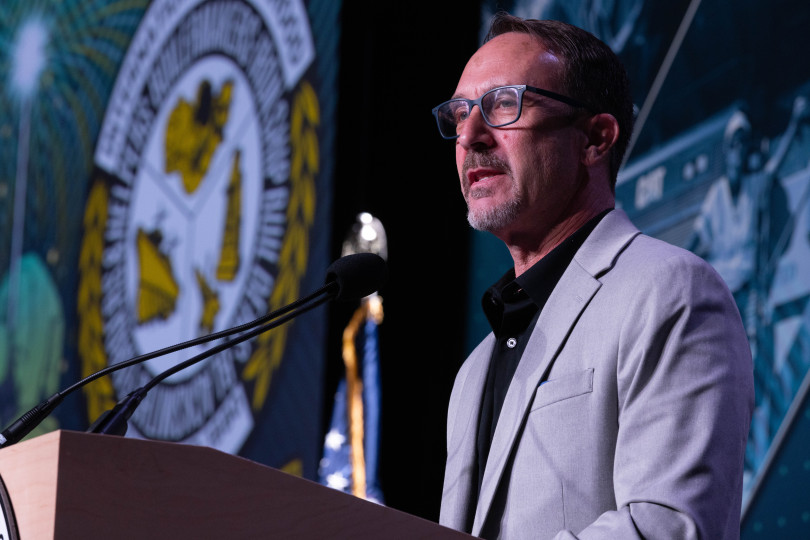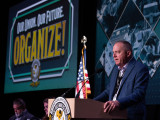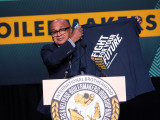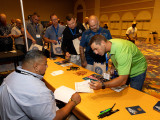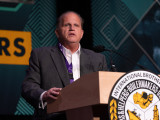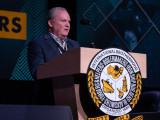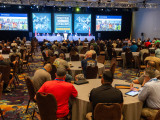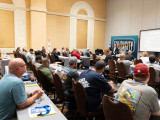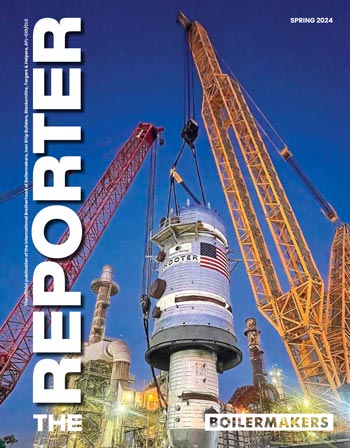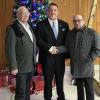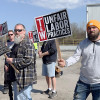The opportunities and possibilities for this union are off the charts if, together, we just take action.”
Doug Bloch, Principal and Strategic Advisor of Bloch Strategies, says union labor’s power is growing.
View Photo Gallery (8 photos)
Despite recent changes in Boilermaker leadership and the transition to a new office location for International staff, the 2023 Industrial Sector Operations conference continued its mission to inform and educate ISO lodge leaders. The conference, held in Las Vegas Aug. 27-31, offered engaging plenary speakers and deep dives into a variety of topics throughout multiple breakout sessions, including industry caucuses, information on the National Labor Relations Board’s decisions, steward training, organizing and more.
Newly elected International President Warren Fairley kicked off the conference with clear communication about the recent changes to the union’s leadership, recounting events within the union over the last several months that resulted in the ouster of former International President Newton Jones. He explained that it began with Jones telling the International Executive Council at the Construction Sector Operations conference in March that he’d taken trips to the Ukraine on the union’s dime, and that it was an acceptable use of union funds.
Then, a three-ring binder surfaced with more details of Jones’ spending. The IEC met over Zoom and went through the binder, page by page. The IEC eventually determined the binder held evidence of inappropriate use of union funds. IVP-NE John Fultz filed Article 17 charges against Jones, and the IEC held a hearing on June 2 in accordance with the rules set forth in the Boilermakers' Constitution. In a unanimous vote, with then-IVP-GL Larry McManamon not in attendance, the IEC removed Jones from office and revoked his membership.
“The four IVPs were committed,” Fairley said. “There was no guarantee of the outcome. I was not the one taking the greatest risk here.”
Fairley emphasized that removing the former president was intended to be an internal matter within the union. It was Jones who chose to take the matter to federal court to file an injunction against the IVPs who’d voted him out. After three hearings in federal court and some tense waiting, the court ruled in favor of the actions taken by the IVPs.
“In a saga that’s worthy of a John Grisham book, on Aug. 15, [the judge] ruled that the actions of the IEC were in accordance with the Constitution,” he said. “I thought it was important to be honest about how we got here. And we think it’s more important to talk about where we’re headed.”
Fairley noted one simple rule to keep top of mind for the union to ensure decisions going forward are in the best interest of the organization and membership. A question to ask: “Is what I’m going to do going to make a Boilermaker’s life better? If no, we’re not going to do it.”
Jimmy Hart, President of the AFL-CIO Metal Trades Department, described President Joe Biden’s visit to the Philly Shipyard, where a Boilermaker apprentice introduced Biden and escorted him around the shipyard. But Hart also told a troubling story of subcontractors in the shipyard taking union work. He noted there’s 12 years’ worth of work at the shipyard, but he questions who will do the work.
“We’re working with too many subcontractors there. We need to organize workers and get them in the shipyards,” he said. “There’s a cancer within us. It’s called subcontracting.”
He gave a rundown of work at various shipyards around the country and how the Metal Trades was designed to represent workers, hear grievances and negotiate contracts. While the Metal Trades has no individual members, it is made up of 17 national affiliates, among them the Boilermakers union.
“No one is doing it better than the Boilermakers in representing its members,” Hart said. “Brothers and sisters, it’s a new day, new dawn, new age—we’ve got to do great things. It’s never about any individual. It’s all about the greater good.
"Remember— organize, organize, organize, recruit.”
Doug Bloch, Principal and Strategic Advisor of Bloch Strategies, shared a welcome report about union labor’s power and the good news of government funding for infrastructure. Bloch is a consultant for the Western States, working with IVP-WS J. Tom Baca in organizing and various other outreaches across the Western States sector.
“I’ve spent a lot of time in the Teamsters and earned the nickname ‘Doug the Thug’ while I was in the Teamsters and I’m proud of that,” he said. “And this is what I’m bringing in the work for the Boilermakers.”
Bloch talked about power. Union power. Boilermaker power. “I think we’re all interested in that, right?”
Unions know when they have power, he said. It’s felt in negotiations and in contracts for members with good wages, benefits and working conditions. He said members see it when they win a grievance, graduate an apprentice and watch people’s lives change through union effort and solidarity.
“We use all sorts of tools to build power. Of course it starts with our members but we also use politics,” Bloch said. “We need to tell members to vote with their pocketbooks, not their parties.”
He told the story from 80 years ago, when before WWII, there were 6,000 workers in the San Francisco Bay shipyard, mostly Boilermakers. When the war broke, the U.S. government put $16 billion into war production contracts in California, which equals $350 billion today. As a result, those 6,000 workers exploded to 240,000 workers.
“Think about how many Boilermakers were hired and put to work through our tax dollars,” he said, noting trillions are coming down from the government to invest in manufacturing, construction, infrastructure and fighting climate change. “This is our money, brothers and sisters.”
With the passage of the Infrastructure Investment and Jobs Act, there is more than $1.2 trillion dollars available to spend over five years in hydrogen, nuclear, wind, supply chains, water, highways, roads, bridges and chips factories.
“It’s like Christmas [multiplied by] I don’t know how much,” Bloch said. “The Christmas tree isn’t large enough to hold all these presents.” Those “presents” include provisions such as prevailing wage and an emphasis to buy American.
Bloch also discussed organizing efforts in the Western States with a win for Boilermakers at Doppelmayr Oakland Airport Connector and the ongoing organizing effort at Siemens in Sacramento, California. Siemens makes light rail vehicles, locomotives, trainsets and high-speed rail.
Bloch said that Siemens pays its welders $22 an hour and offers poor benefits. The plant has such high turnover the company brings in foreign workers on visas. “They’re 100% union in Germany, but they’ve fought every union organizing drive at this plant for the last 20 years.”
Siemens has a $3.4 billion contract to build trains for Amtrak. And Bloch and the Boilermakers have been working with lawmakers and other political players to address Siemens’ pushback on union organizing.
“What do you think our president, who went by the name ‘Amtrak Joe’ would think if Amtrak’s train supplier was fighting the Boilermakers from organizing the workers into the union?” asked Bloch. “We’re just getting warmed up. This is how we’re using politics to organize.”
Alexander Ivanou, IndustriALL’s Director of Material Industries, offered an overview of workers around the world. IndustriALL represents 50 million workers across 135 countries, supporting 570 affiliate organizations, including the Boilermakers.
“Workers’ rights are under increasing attack,” he said, noting that workers were arrested and detained in 69 countries and murdered in eight.
IndustriALL works to mitigate global core problems such as excessive workloads, inadequate safety measures, lack of protective gear and outdated equipment, job security, wage disparities and lack of training and skill development.
Director of Government Affairs Cecile Conroy discussed what’s happening in Congress. She said the Richard L. Trumka Protecting Our Right to Organize Act—the PRO Act, was reintroduced in February. And in March, Senator Bob Casey, D-PA, reintroduced his Tax Fairness for Workers Act which includes a union dues deduction, and his No Tax Breaks for Union Busting Act. She also recapped and summarized the Infrastructure Investment and Jobs Act.
Members also heard from Western State Director of Organizing Manuel Valenzuela, Union Plus service representative Keith Anderko and Executive Director and CEO of Union Sportsmen’s Alliance Walt Ingram.
During his closing remarks, ED-ISO Jeff Campbell stressed the urgent need to organize more people into the union.
“The opportunities and possibilities for this union are off the charts if, together, we just take action,” he said.
Campbell pointed out that lodge leaders gained a lot of new knowledge, resources and networking contacts at the conference. He challenged attendees to reach out and engage the membership and achieve 100% buy-in from members.
“There is no problem a Boilermaker cannot solve. There is no piece of metal a Boilermaker cannot weld and repair. There is no size ship a Boilermaker cannot build. There is no rock or material a Boilermaker cannot tame and mine from the Earth,” Campbell said. “There is no product a Boilermaker cannot manufacture. There is nothing a Boilermaker cannot forge or fabricate. And, there is no worksite a Boilermaker cannot organize.”

